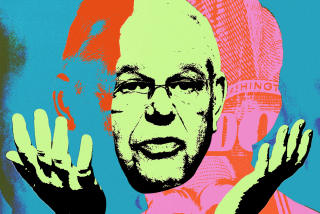With Help From Up High, Cooder’s Back in Cuba
- Share via
WASHINGTON — Musician Ry Cooder, who was once fined by the U.S. government for traveling to Cuba without permission to collaborate with the acclaimed musicians known as the Buena Vista Social Club, is back in Cuba recording music.
And this time, thanks to last-minute intervention from top Clinton administration officials, he’s legal.
Cooder, a singer, guitarist and songwriter, who with his Cuban colleagues won a Grammy Award in 1998, received U.S. permission to make new recordings in Cuba after then-Secretary of State Madeleine Albright and Sandy Berger, former President Bill Clinton’s national security advisor, weighed in on his behalf in the last days of the administration, U.S. officials say.
Although his newest project is probably good news for fans of Cuban music, the high-level attention given to his case within the government raises new questions about the Clinton administration’s final days in power.
Having encountered trouble last year in obtaining a license from the Treasury Department for a new trip to Cuba, Cooder gave $10,000 to Hillary Rodham Clinton’s senatorial campaign in September.
On Jan. 17, three days before President Clinton left office, Cooder was granted the license.
Representatives of Sen. Hillary Rodham Clinton and former administration officials said there was no connection between Cooder’s campaign contributions and the Treasury Department’s approval of a new Cooder trip.
“She was not involved in this matter,” said Karen Dunn, a spokeswoman for the senator.
Cooder’s California-based lawyer also denied a link, saying the musician supported Sen. Clinton generally as a candidate and expected no personal gain from the contribution.
“Ry’s made donations to a number of politicians and done it over a number of years,” said the lawyer, Candice Hanson. “Hillary Clinton--I bet she doesn’t know who Ry Cooder is. As far as I know, she doesn’t have anything to do with this.”
Cooder has contributed to the campaigns of both California Democratic senators, Barbara Boxer and Dianne Feinstein. But those donations did not approach the size of the Hillary Clinton contribution, according to federal records.
Campaign finance specialists said that Cooder’s donation and the subsequent satisfaction he received from the administration are troubling.
“This is the problem with the whole system--it calls all these decisions into question,” said Lawrence Noble, executive director of the Center for Responsive Politics in Washington. “The decision may have been made for very legitimate and impartial reasons. But it leaves one to wonder what was his motive in giving the contribution.”
More than a year ago, Cooder was fined $25,000 by the Treasury Department for failing to obtain a U.S. license for his first recording trip to Cuba in 1996, which resulted in the Grammy-winning “Buena Vista Social Club” album. The fine has not been previously disclosed.
Because of its repressive Communist regime, Cuba has been under a strict U.S. embargo since the 1960s. Though legal travel to Cuba by Americans has skyrocketed in recent years, Cooder’s January 2000 application to make a new recording trip languished for months in the Treasury Department.
A second unlawful trip might have subjected Cooder to an even higher fine and possible criminal penalties. But Hanson, his lawyer, said the guitarist was eager to resume accompanying and recording such aging Cuban virtuosos as Ibrahim Ferrer, who starred on the first “Buena Vista” album.
In August, the government said it would approve Cooder’s application so long as he earned no money from any new Cuban projects, according to Hanson and a congressional official. Cooder rejected that offer. He reapplied for a travel permit Nov. 7.
As the final days of the administration approached, Cooder’s application had still not been approved. But both Berger and Albright were told of his case and, through intermediaries, informed the Treasury Department’s Office of Foreign Assets Control of their support, according to a former senior administration official.
“None of the policymakers were aware of any fund-raising contribution in this situation,” said the official, who spoke on condition of anonymity. “The secretary did not talk to OFAC. Sandy Berger did not talk to OFAC.”
Brooke Anderson, a spokeswoman for Berger, said: “Ry Cooder wrote to Mr. Berger, and Sandy had a discussion with Secretary Albright about this, and they both thought it was a logical extension of the people-to-people contacts” promoted by the administration between Cuba and the United States.
Berger knew of no campaign contributions and did not discuss Cooder’s travel request with Sen. Clinton, Anderson said. Berger might have mentioned Cooder to President Clinton, she said, but only in the context of dozens of other tasks that had to be completed before the end of the term.
Albright and her spokeswoman could not be reached for comment.
The Clinton administration has been sharply criticized for several actions taken in its final days, especially for the former president’s pardon of Marc Rich, a fugitive billionaire commodities trader.
Rich was indicted in 1981 on charges of tax evasion, fraud and racketeering; he fled to Switzerland to avoid prosecution. His former wife, Denise Rich, has donated hundreds of thousands of dollars to Democrats, including $7,000 to Sen. Clinton’s campaign.
Cooder had other government officials on his side in addition to those in the administration. Perhaps his biggest champion in Washington is Rep. Howard L. Berman (D-Mission Hills), who often takes an interest in intellectual property issues and who spearheaded a 1988 amendment that enabled the expansion of cultural contacts between Cuba and the United States.
*
“We were calling them in the State Department with great frequency” to urge approval of Cooder’s travel application, said Gene Smith, Berman’s chief of staff. The congressman “even called when he was out of the country.”
Cooder has not contributed money to Berman’s campaigns, federal records show.
At least part of the delay in approving Cooder’s license had to do with differing opinions between Berman’s office and Treasury officials over whether the visit would be allowed under the 1988 measure, she said.
And some of the urgency to approve the permit stemmed from the fear that the Bush administration would reject it, in a bow to anti-Castro Floridians who oppose such activity, she said.
“We saw this administration coming to an end and a president coming to power who owed everything to Florida,” where Bush won the White House on a disputed election count, Smith said.
For his part, Cooder wasted no time in getting to his latest project. He left for Cuba immediately after the license was approved and is there now, planning to record with guitarist Manuel Galban and 73-year-old crooner Ferrer, Hanson said.
“He wanted to get the record in the can,” Hanson said. “When this man thought [last year] that he couldn’t record with these Cuban musicians again, he was devastated.”
More to Read
The biggest entertainment stories
Get our big stories about Hollywood, film, television, music, arts, culture and more right in your inbox as soon as they publish.
You may occasionally receive promotional content from the Los Angeles Times.










